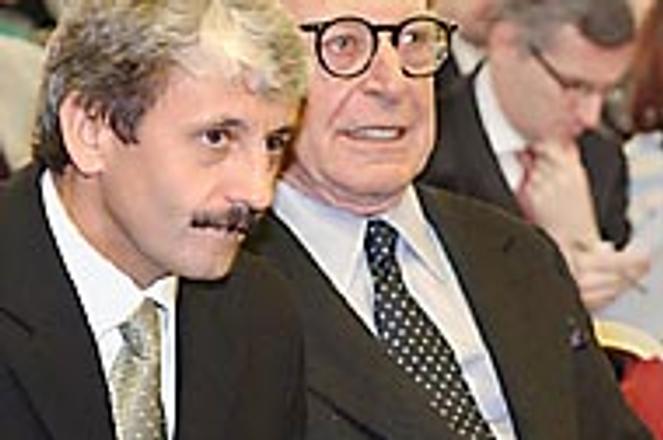PM Mikuláš Dzurinda lends an ear to former US Ambassador Carl Spielvogel at the Inwest conference.photo: TASR
Despite a huge effort to raise Slovakia's profile abroad investors are still scared of a return to power of Vladimír Mečiar, claims a former US ambassador to the country.
"The thought that some of the things that were characteristic under his term might return sends a shiver down the spine of a number of investors," Carl Spielvogel, US Ambassador to Slovakia until April this year, told The Slovak Spectator.
Spielvogel, talking during an international investment conference in Bratislava November 19, added that while Mečiar's HZDS party had recently declared a new pro-western stance there were still doubts among investors as to the former PM's sincerity.
"Any chief executive officer looking to make an investment in a country looks at four things: political stability, transparency, corruption and croney capitalism. All of those things existed under Mečiar. No CEO is going to go to his board of directors and say 'this is what happened before under him but it's not going to happen again'. There is real concern about Mečiar," he said.
The former diplomat's comments ran against a number of recent encouraging reports from international business institutions that foreign investors, crucial to sustaining Slovak economic growth, should not fear a return of the HZDS leader.
Ratings agencies Standard & Poor's and Moody's have recently upgraded their investment ratings for Slovakia. Both said they felt confident the results of next September's parliamentary elections would not affect the general orientation of the country towards EU membership.
Past investment conferences have raise the country's profile.photo: Courtesy B+ Business
Mečiar's policies during his last term in power from 1994 to 1998 led to Slovakia's exclusion from the 1999 round of Nato expansion and invitations in 1997 to a host of central European states to begin negotiations on EU entry.
But despite the recent encouragement from the ratings agencies Spielvogel says real concerns are still being raised in the US about the country's post-election political make-up, especially with regard to Nato membership.
"Slovakia has done an awful lot to raise its profile abroad and people are taking notice of that. But the cloud on the investment horizon is that people are asking the question: 'Are they going to slip back to the old ways with Mečiar? He was sort of tagged as the same type along with Yugoslav leader Slobodan Milosevic.
"Mečiar may have said he supports getting into Nato, but what will Nato think of that?" he said.
The Inwest Forum investment conference, at which Spielvogel made spoke, was part of push the Dzurinda administration has made to raise the country's profile among foreign investment communities.
It came just a few weeks after Dzurinda appeared on CNN's Larry King Live, one of the most watched TV shows in America.
The PM also ran the New York marathon two days after his appearance on prime-time television, meeting senators and New York mayor Rudolf Giuliani, in what he called a show of "empathy with the people of America and especially of New York" following the September 11 terrorist attacks.
Many conference attendees said the visit had made more potential investors aware of the country and built on other promotional trips abroad, such as an inaugural Month of Slovak Culture in New York in February and a recent investment presentation made by the PM in Norway.
"Without doubt a huge amount has been done to raise this country's profile abroad. There is no question that enormous work has gone into promoting and presenting Slovakia abroad.
"Just look at Prime Minister Dzurinda in Norway last month. His presentation was very well received and we also had the Norwegian company Norsk Hydro give a good presentation of their own experiences in investing in Slovalco," said Alan Sitár, advisor to the prime minister on investment.
However he warned that more work had to be done to sustain growing foreign direct investment (FDI).
Other speakers at the conference warned a lack of reforms in certain sectors and a failure to adequately deal with corruption were hindering FDI.
"There is a special problem of corruption in all transition countries. After three years of anti-corruption campaigning under our term we can see that in some areas, such as banks and the financial sector, there has been a 50% reduction in the perception of corruption since 1997. But in areas like the health sector, the police and judiciary there has been little or no progress on the perception of corruption.
"Reforms have been deep in the banking sector and we have seen real progress there but where there has been no reform, such as in education, health etc. there have been no real results against corruption," said Ivan Mikloš, Deputy PM for the Economy.
"We need to carry out deep reforms in these fields," he said.


